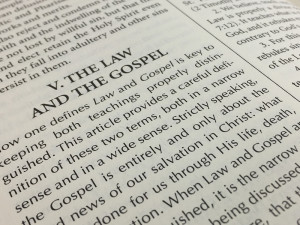by Rev. Paul M. Doellinger

“Am I really saved? Am I doing enough? Will God even recognize my good works on Judgment Day?” These sorts of questions are born out of the Law, which always demands and never gives. The Law frightens us: its commands leave us with no excuse and its threats leave us with no escape. Conversely, the Gospel—God’s promise of grace—demands nothing of us, but gives everything to us, including our works of righteousness done in faith. It proclaims to us that Jesus has done everything necessary for our salvation; that we are forgiven of our sins for the sake of His vicarious death and resurrection for us, and creates us anew to live before God in righteousness and purity, here in time and for eternity.
Read Galatians 4:1-7.
- We are “enslaved” under the Law, which Paul calls the “elementary principles of the world” (Galatians 4:3). Here’s Luther’s description of life under the Law: “Our conscience was subject to the Law which exercised its tyranny over us with all its might. It whipped us as a tyrant whips his captive slave. It held us confined and captive; that is, made us fearful, sad, pale, and desperate, by threatening us with eternal death and damnation… [which] lasts until Christ comes. So long as He is absent, we are slaves, confined under the Law, lacking grace, faith, and all the gifts of the Holy Spirit. But after Christ comes, the imprisonment and slavery of the Law come to an end.” [1] What is the primary function of the Law?
- The Law is the outward commands and demands of God set down in the Scriptures. “The Law of Moses produces nothing that goes beyond the things of this world; that is, it merely shows…the evils that there are in the world. With its terrors it merely drives the conscience to thirst and yearn for the promise of God and look at Christ.” [2] How is the Law useful and good?
- Christ has conquered the Law for you. “By this victory of His, Christ has driven the Law to flight from our conscience, so that it can no longer confound us in the sight of God or bring us to despair and condemn us. Of course, it does not cease manifesting our sin, accusing, and terrifying, but when the conscience takes hold of this word of the apostle—‘Christ has redeemed us from the Law’—it is encouraged by faith and receives comfort.” [3] When we are frightened or terrified by words of Law, where should we flee?
- God sends His Holy Spirit into our hearts to comfort us with His Word of Gospel. “Now it is time to turn your eyes away from the Law, from works, and from your own feelings and conscience, to lay hold of the Gospel, and to depend solely on the promise of God. Thus there is emitted a little sigh, which silences and drowns out that violent roaring; and nothing remains in your heart but the sigh that says: ‘Abba! Father!’ However much the Law may accuse me, and sin and death may terrify me, nevertheless Thou, O God, dost promise grace, righteousness, and eternal life through Christ.” [4] What does God say to sinners whose consciences are burdened by the Law and its threats?
- In the hour of horrible darkness, when surrounded by anxieties and fear; when you feel that God hates you, and has banished and deserted you, “It is impossible ever to decide what God wills and what is pleasing to Him, except in His Word. This Word makes us certain that God has cast away all His wrath and hatred toward us when He gave His only Son for our sins. The Sacraments, [Absolution], etc. also make us certain; for if God did not love us, He would never have given us these.” [5] What should we trust in more: our feelings or God’s eternal Word of forgiveness?
In Baptism God has made you an heir of His kingdom and all the inheritance of heaven. Christ Jesus was born under the Law in order to redeem you from the Law. Now you are no longer a slave to the Law, but are sons and daughters of God. This is faith, in which, as Luther describes, “No Law, no work is demanded here. There is only the Father here, promising and calling me His son through Christ, who was born under the Law…There is no demand here, but only the sigh of the son, who grows confident in the midst of tribulation and says: ‘Thou dost promise and dost call me ‘son’ on account of Christ.’” [6]
The Christian always endeavors to live a godly life and do good works. The question then arises in our conscience: “Will God even notice my good works? Are they good enough?” Justifying faith looks not to itself but to its Lord. This is why the sheep have no recollection of their good works on Judgment Day (Matthew 25:37-40). He who is no longer a slave but a Son will necessarily do the works of the Son, who now dwells in Him. The sigh—even when we don’t see or feel it—is now lived out in the life of the believer. Even our good works are gifts of God to us!
When you are terrified by the Law, look to the Gospel. God has sent His Holy Spirit into your heart. By the Gospel of all sins forgiven, the Spirit calls you in order to comfort your terrified conscience. If you want to know how God is towards you, what He thinks of you, then don’t look to the Law or your works. The Christian necessarily bears the good fruit of good works because the righteous live by faith. And from now until Judgment Day we are given to trust Christ Jesus and His Gospel. For as Luther says, “The Law says, ‘do this,’ and it is never done. Grace says, ‘believe in this,’ and everything is already done.” [7]
The Reverend Paul M. Doellinger is pastor of St. Paul Lutheran Church, Cassopolis, MI.
[1] Luther, Martin. Luther’s Works, vol. 26: Lectures on Galatians, 1535, Chapters 1-4 (J. J. 2Pelikan, H. C. Oswald & H. T. Lehmann, Ed.). Saint Louis: Concordia Publishing House, 1963., pg. 362
[2] Ibid. pg. 364
[3] Ibid. pg. 371
[4] Ibid. pg. 389
[5] Ibid. pg. 388
[6] Ibid. pg. 390
[7] Luther, Martin. Luther’s Works, vol. 31: Career of the Reformer I (Harold J. Grimm & H. T. Lehmann, Ed.). Saint Louis: Concordia Publishing House, 1957., pg. 41
